A Resurrection Story: “My life was a living hell surrounded by the walking dead.”
By a friend of the Fontanas who wishes to remain anonymous
I’d like to briefly share my struggles with drug addiction and the road that led to my recovery in the hope of inspiring anyone who may be struggling or knows someone who is struggling.

I am middle age and a software engineer by trade. My childhood was a tale of two cities. On one hand, I was blessed to belong to a very large, supportive, and loving extended family. But on the other hand, at home, in a low-income neighborhood, my immediate family was very dysfunctional. My mom and biological father separated when I was a baby. My mom remarried and my stepdad became my dad. My parents divorced when I was 5 years old, and my siblings and I were left living with our single mother who struggled financially with a minimum wage job and four young kids to support. She then married a physically and emotionally abusive man, got hooked on cocaine and crack. From there our home life was filled with chaos, violence, and pain. Mom died from a drug overdose when I was 13 years old.
After she died, my siblings and I went to live with our father who had remarried a woman who drove a wedge between him and our family. I wasn’t fond of her, and began to act out. I was putting a strain on his marriage, so he told me it was best that I leave. I called up my grandparents and moved out at 16. He and I are still estranged to this day.
I started to smoke pot. My weed use led me though different social circles, where eventually I met a girlfriend who introduced me to meth. I immediately loved the euphoric feeling it gave me. It suppressed all negative emotions and only amplified positive ones. There were no more feelings of worthlessness and self-loathing. This revelation then inspired me to try anything and everything else I could get my hands on; crack, cocaine, heroin, LSD, mushrooms – you name it, I consumed it in abundance. My late teens and 20s were a complete blur, oscillating between addiction and sobriety, my grandma’s house and slapdash living arrangements, unemployment and various odd jobs like a delivery driver, auto mechanic, and bus boy.
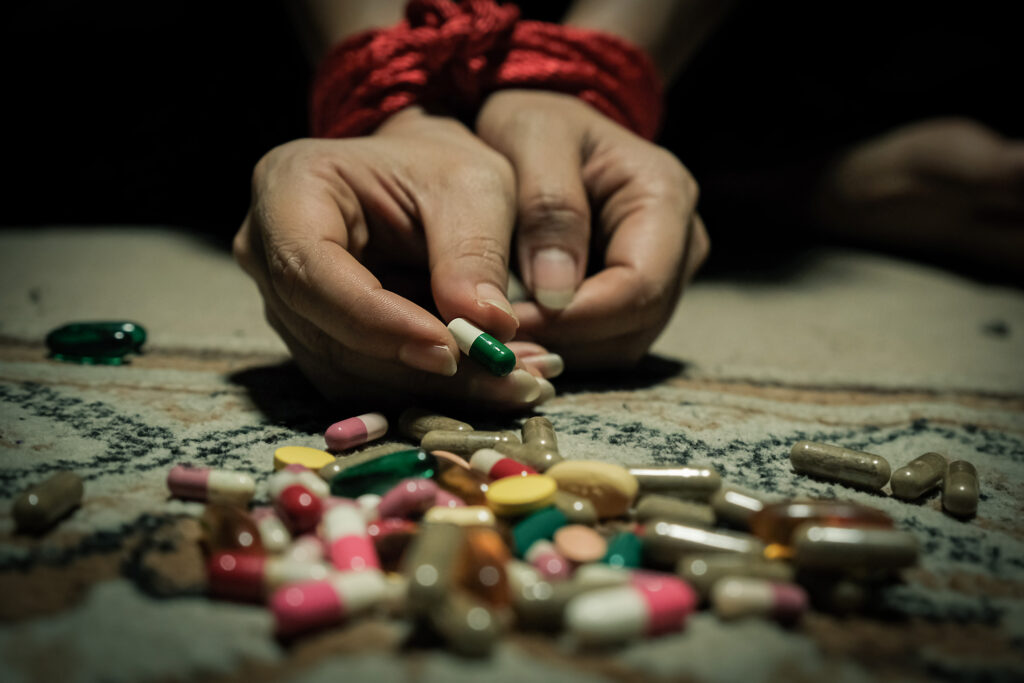
Miraculously, during one of my sober stretches (imposed by a very bad DUI conviction), I graduated from the university with a degree in mathematics. Shortly thereafter, I landed my first professional job as a business intelligence developer. I was dating someone again, but a week before my first day at the company, the perfect storm happened. My girlfriend and I broke up, and while in despair I bumped into an old acquaintance with whom I used to do drugs, and we smoked some meth. From that day forward, every day for the next 5 years, I was a full-blown meth addict.
For a while I was a high functioning meth addict. I would crush it up and mix it with some juice or coffee that I’d keep at my desk and just sip all day long. I used it every day – before work, during work and after. While everyone around me was moving forward in life, getting married, having kids, getting promoted, going places – I was content just standing still, hunched over a computer screen in a corner, getting high and writing software. At the end of the day when all my colleagues returned home to their families, I returned to a drug den to get high with very bad people. I was under the illusion that they were the people I belonged with, the unwanted, the outcast. That’s the narrative I force-fed myself, and eventually believed.
This went on for 3 years. A day came when I was barely functioning at all. I would go days without sleep and show up to the office with pupils so dilated my eyes were black, barely able to string together complete sentences. My personal hygiene had gone down the drain, not showering or washing my clothes. I started to skip important meetings with executives, missed critical presentations, and disregarded important deadlines. And my attendance started to slip.
During all this time, my manager, who was a very empathetic person, had tried his best to reach out to me, as he obviously sensed something was profoundly wrong. He repeatedly made efforts to help me – vacation time to rest, flexible scheduling, new projects to work on. But it finally came to the point when one day he took me into his office and gently fired me.
My addiction had fully metastasized and taken over my life. I hung out at dope spots, getting high and going nowhere. Within 6 months I was completely broke. I had burned through my savings and was 80k dollars in debt from maxed out credit cards. My car was repossessed. I was borrowing money from as many people as possible and not paying them back, burning bridges left and right, flaking out on anyone who still bothered to be in my life. I had reached a point of total desperation, as I had an insatiable drug addiction, and no money to buy drugs. The only vestige of stability left in my life was living at my grandmother’s house, but I managed to screw that up too when I stole from her to buy drugs and was kicked out onto the streets.
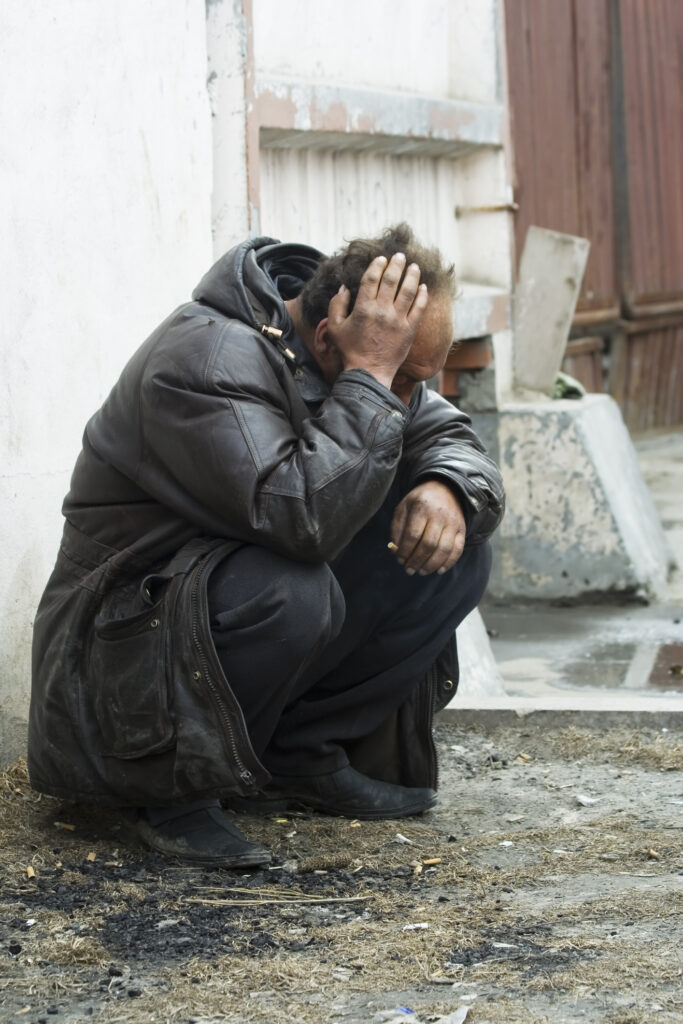
My life was a living hell surrounded by the walking dead. I was homeless for an entire year and ran around with addicts, dealers, felons, thieves, and convicted murderers. I slept in green belts, gutted RVs, backyards, front yards, cars, tents. I did whatever I could to get dope. I had multiple encounters with the police. I knew people who died from gun violence, suicide, and fentanyl overdose. My entire life revolved around one sole purpose which was to acquire meth.
For a while I had accepted my fate because I truly believed I possessed no inherent value as a human. In a way it was all a penance, a restitution for being unworthy of love, and for bringing shame upon my family. But from time to time, I would reach out to certain family members with a borrowed cell phone just to maintain a tether to the land of the living. Sometimes I’d talk to my brother, other times my cousin. Late one night as I was walking aimlessly through the streets, I had the epiphany that I had hit rock bottom, and it wouldn’t be long before I was either in jail or dead. I realized I wanted to live and so the next day I called my cousin, and he helped set up an intervention with my extended family. This intervention included my biological father who was a big part of my recovery.
After the intervention, my family generously put their money together and sent me to Mexico to receive an experimental treatment known as Ibogaine, which is one of the world’s most powerful hallucinogens, derived from a tree bark indigenous to Africa. It’s an intense therapy where you are administered a large dose and then monitored by nurses in a controlled hospital setting as you hallucinate for 24 hours straight. It was one of the most terrifying experiences of my life. At first, I relived the most painful events of my life, but later in the trip the fear slowly faded away into acceptance, forgiveness, and finally a deep peace that I’ve carried with me to this day. Ibogaine was nothing short of a miracle drug for me. I’m happy to see that its applications to not only addiction, but also depression and PTSD, are becoming more well known.
When I returned to my family my lovely aunt and uncle graciously allowed me to stay with them. They housed me, fed me, helped set up outpatient treatment, treated me like their own child. After 4 months there, I moved into a halfway house where I lived with other recovering addicts, gradually easing my way into independent responsible living. Within 2 months I landed a job as a data engineer and had my own apartment.

Fast forward 8 years and I am still sober. I’ve paid off 100k in debt, got another car, gone through numerous promotions at work, and recently bought a house. I was able to reconnect with one of the guys I knew on the streets and started sponsoring him. He’s been sober for 3 years now and has completely transformed his life. Most importantly, I repaired my familial relationships, including my grandmother whose heart I once broke.
It’s a wonderful feeling to be loved by so many people. Rather than having 2 parents, it’s like I have dozens, which is pretty special. In the end I realized that love is the one redemptive force in the world, and family is its purest form. From love extends all good things in life: forgiveness, redemption, peace, sobriety. All it takes is for one person to love someone else, to show that person they are worthy of love and in doing so, perhaps most importantly, teach that person to love themself. Luckily for myself, I had dozens of beautiful people to teach me: brothers, sisters, cousins, aunts and uncles, grandparents, nieces and nephews.
I am also especially grateful for my siblings, who, having gone through the same painful experiences I had, were much stronger than I, and managed to process and overcome their pain without succumbing to the pitfalls that befell me. Their strength is an inspiration to me.
Thanks for taking the time to read this.
God Bless.

Good Friday Reflection: Jesus’ death means more than opening the doors to heaven.
By Robert Fontana

Jesus is not content to have his followers remain in the upper room, in Greek, “Cenacle.” The Cenacle is that warm place of close friendships, Eucharist, foot-washing, and drawing near to the Father’s love in the Son and through the Holy Spirit. The entire purpose of the Cenacle experience is to prepare its participants to leave its safety and security and enter the graced and broken world to be a power for good. It is into the “world” that God so loves that he sent his only Son, not to condemn it, but to save it. John 3:16
The “world” does not mean secular society and culture as opposed to life in the Church with its focus on faith and religious practice. “The world” in Scripture refers to the collective power of sin that shows itself in selfishness, self-centeredness, and violence; the abuse of human rights, break up of families, and the denial of dignity to so many: the unborn, migrants, the elderly, the imprisoned, the disabled, the ill in body and mind.
Jesus leads us out of the Cenacle into the world, a journey that always leads to the cross:
So they took Jesus; and carrying the cross by himself, he went out to what is called The Place of the Skull, which in Hebrew is called Golgotha. There they crucified him, and with him two others, one on either side, with Jesus between them…
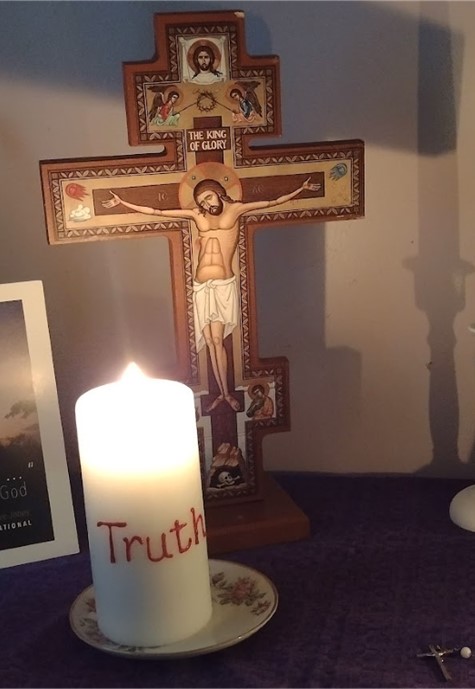
A few women from the Cenacle, including Jesus’ mother, and the “Beloved Disciple,” remained with him at the cross. They remained because of love, because they knew that Jesus, who was condemned as a criminal, was just the opposite. But they did not understand, could not understand until after the resurrection, the full meaning of this death: it was a life-giving death, a world-saving death for every human being that had ever lived and would ever live, and for creation itself. For Jesus’ death reconciled the world to God and paved the way to eternal life:
…now Christ has been raised from the dead, the first fruits of those who have fallen asleep. For since death came through a human being, the resurrection of the dead came also through a human being. For just as in Adam all die, so too in Christ shall all be brought to life, but each one in proper order: Christ the first fruits; then, at his coming, those who belong to Christ… (1 Cor 15:20-23)
But Jesus’ death means more than simply opening the doors to heaven. Jesus leads his followers to the cross because in his dying Jesus embraces suffering humanity and invites his followers to do the same. Some of his followers could not bear to be with Jesus in his suffering, and they fled. But others who were more stout-hearted, mostly women including his mother, stood with him in painful solidarity:
Meanwhile, standing near the cross of Jesus were his mother, and his mother’s sister, Mary the wife of Clopas, and Mary Magdalene. When Jesus saw his mother and the disciple whom he loved standing beside her, he said to his mother, “Woman, here is your son.” Then he said to the disciple, “Here is your mother.” And from that hour the disciple took her into his own home…
Good Friday reminds us that we too can stand with the suffering Jesus today, not merely liturgically but personally, by risking to step into the lives of suffering people and assist them in bearing the burden of their suffering. Clearly that is the meaning of Simon of Cyrene who helped Jesus carry his cross. Can we help children, the sick, the mentally ill, the immigrant and refugee, the unemployed and underemployed, the elderly and lonely, know the love of God through sharing our care and compassion?

Fr. Thomas Judge, the founder of the Missionary Cenacle Family to which Lori and I belong, understood this as well. He insisted that the abandoned Christ on the cross, “the naked, crucified Jesus on Calvary,” is the Christ of the Cenacle (Meditations, p. 327); and Christ crucified can only be truly loved and comforted by loving and comforting the poor and spiritually abandoned in the world, those individuals and groups of people who do not know God’s love or the love of their neighbor. The Cenacle that stands at the cross in solidarity with the suffering Jesus is the Cenacle that stands in solidarity with suffering humanity.
On Good Friday we are reminded of the salvific death of Jesus, a death that bore the sins of the world and opened for all of humanity and creation itself, life everlasting. With this truth is a corresponding truth: we disciples of Jesus most effectively remember Jesus’ death by our personal solidarity and service to the suffering people we meet within the providence of our everyday lives.
Holy Spirit inspired “books” for Lent:The Bible and National Geographic
By Robert Fontana
For all of you observing Lent, reading and praying through the Bible is a no-brainer. I can see your raised eyebrows with my suggestion that you also read the National Geographic magazine. First let me comment on reading and praying the Bible.

When I was in graduate school, a professor posed this question to the class: Is the Bible prescriptive for the life of believers today or descriptive of life of believers of the past? What do you say to that question?
Biblical fundamentalists lean towards the “prescription” side of the question, believing that the Bible prescribes in specifics how we must live today. We dare not veer from its direction less we incur the wrath of God. Of course, there are real problems with this view. The Hebrew and Christian Bibles support slavery, a non-scientific view of the origins of the known universe, strict male dominance in the family and church, and religious domination of the nation. Christian nationalism is an outgrowth of this view of the Bible.
There are also real problems with saying that the Bible is only “descriptive” of how the people in biblical times lived and does not have serious guidelines for us today. Radical proponents of this view reject anything unique in the Bible. For them, Jesus is another figure in history like Moses, Buddha, and Mohammed. The goal of the spiritual life is self-actualization. “Sin” consists fundamentally of the social structures that sustain racism, consumerism, and power.
As so often happens in the spiritual life, the truth lies in a “both/and” approach to the issue. There are teachings and insights in the Bible that we need to insist are prescriptive for us today, e.g. belief in Jesus as the Beloved Son of God, and the ethical standards of the 10 Commandments and the Beatitudes. But clearly, not everything is prescriptive. We are not going to blame all mental health problems and disease on the devil and depend solely on praying with greater faith for healing.
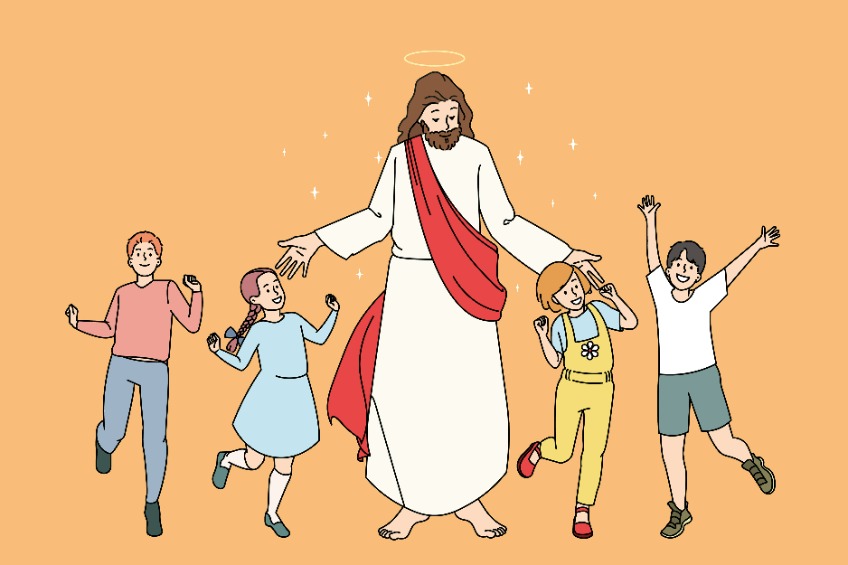
When you read and pray the Bible this Lent, remember this: before there was ever one written word of the Bible, there was a community of faith, the Hebrew people from the time of Abraham to Jesus, and, after the Resurrection, a Jewish-Christian people. Until the time of King David, the Hebrews lived their lives of faith without any written “Word of God.” Furthermore, the Hebrew Bible as we know it did not reach its full form until the time of Jesus. Without a written “Word of God,” how did they pass on the revelations they had received from God? The answer lies in the living faith of the people – their music, stories, laws, rituals, and symbols.
The same is true for the early followers of Jesus. There was no written New Testament as we know it until the end of the fourth century. How did the early Christians pass on and interpret the revelation of Jesus without a written Bible? Again, – through storytelling, music, laws, rituals, and symbols.
Clearly the “Word of God” is not fully contained in a book, the Bible. For Christians the “Word of God” is the Risen Jesus who is present to His people in the written word which gives testimony to how the first followers of Jesus understood who he is and how they were to live as his disciples. Jesus is also present in the lives of holy men and women in history who teach how to follow Jesus in their particular time and place. And we know the presence of Jesus through the lived experience of God’s people today. Each generation of believers gets to pray through the Scriptures and discern what the risen Jesus is saying through his word in Scripture, through his word in Church history, and through his word to the living Church today.
We take the Scriptures seriously but not literally. According to the Catechism of the Catholic Church, “we must acknowledge that the books of Scripture, firmly, faithfully, and without error teach that truth which God, for the sake of our salvation, wished to see confided to the Sacred Scriptures.” (Art. 107) We discern with the Church, the community of faith, what is descriptive of the life of believers from the past and is not binding for us today, and what is still prescriptive from the past and must be adhered to. An example of the first (descriptive) is the biblical acceptance of slavery. A prescriptive biblical passage is Jesus’ teaching:
“But to you who hear I say, love your enemies, do good to those who hate you, bless those who curse you, pray for those who mistreat you…Do to others as you would have them do to you. For if you love those who love you, what credit is that to you? Even sinners love those who love them.” (Luke 6:27-28, 31-32)
The Bible is not a science book. It does teach that God created the world, and we build on that with the scientific evidence gathered over centuries, from dinosaur bones to pulsars.
The Bible teaches that created things can manifest the presence of God. St. Paul makes this clear in his letter to the Christians in Rome: “Ever since the creation of the world, his invisible attributes of eternal power and divinity have been able to be understood and perceived in what he has made.”
(Romans 1:20) Many sources illuminate and illustrate the unfolding of God’s creative power in the vastness of the universe and in our tiny universe of planet Earth.
National Geographic helps me to better understand God’s creative power, active in the world. I am humbled and amazed with every issue as its writers and photographers reveal the beauty, complexity, and even fragility of the Earth, God’s creation, which we share with flora and fauna great and small.

For example, in a recent NG magazine on whales, the writer tells the story of a researcher who observed a baby beluga whale through the glass of an aquarium tank. As the two stared at one another, the researcher, smoking a cigarette, blew a cloud of smoke towards the baby Beluga. The baby swam off, returning a few seconds later with its mother who proceeded to release her mother’s milk, creating a cloudlike display which resembled the puff of cigarette smoke. WOW!! What is going on here? A Beluga watching a human. A baby whale communicating with its mother. Mother whale mimicking the human. I’m in awe.
The Holy Spirit inspires the Bible, but we must discern what in the Bible is “prescriptive,” as we prayerfully distinguish what we hold on to for our lives today.
The Holy Spirit is the creative power that brings forth life on our planet. Through different sources, such as scientific journals, we can learn more about the Spirit’s creative power and how to cooperate with it so that life continues on our planet.
Along with the Bible, National Geographic can be great spiritual reading for Lent.
The Lenten Journey, when Jesus comforts the afflicted and afflicts the comfortable
By Robert Fontana
Lent is fast approaching. And in Providential irony, Ash Wednesday is also St. Valentine’s Day (February 14). How about that for a divine challenge! Ash Wednesday invites us to fast, pray, and give alms. St. Valentine’s Day invites us to splurge on dinner, show love to those we love, and give flowers and lots of chocolate. And it follows that other day of great splurging – Fat Tuesday aka Mardi Gras. The last big “let the good times roll” before the disciplines of Lent take hold (with exceptions, of course, for St. Patrick and St. Joseph feast days).

However you resolve the dilemma of Ash Wednesday’s coinciding with St. Valentine’s Day, prepare yourself now for the spiritual journey you want to take during the great 40 days of Lent. On this retreat we followers of Jesus are invited to encounter the Lord with all the honesty and authenticity that we can muster. If we do this, if we sincerely prepare ourselves to encounter Jesus anew, it can be a wild and crazy ride because Jesus does not fit neatly into our liberal – conservative categories.
We don’t get the Jesus we want. We get the Jesus we need.
Keep in mind, the Jesus who said,
“Come to me all you who are weary, and I will give you rest,” (Mt 11:28)
is the same Jesus who said,
“Do not think that I have come to bring peace upon the earth. I have come to bring not peace but the sword. For I have come to set a man ‘against his father, a daughter against her mother, and a daughter-in-law against her mother-in-law; and one’s enemies will be those of his household.’” (Mt 10:34)
At first glance it might seem Jesus is being schizophrenic, a Dr. Jekyll and Mr. Hyde. However, most parents, teachers and anyone who cares for children and youth know that we must do this delicate balancing act of “comforting and afflicting (or challenging) our children all the time.
For example, your son, trying to impress a girl with his driving skills, backs into a car. The other car has very little damage but the rear of your car is crushed. Your son, with tears in his eyes, comes to tell you what happened. You, of course, are glad that no one was hurt and feel bad for your son who clearly shows remorse. You hold him in your arms, tell him you love him, remind him that cars can be fixed and that you are glad he is alright. He feels consoled, cared for, and comforted. The “afflicted is comforted.” He is reminded that he is absolutely loved no matter what!
But wait, that’s not the end of it. You look your son in the eyes and say, “Of course, you will have to pay for the repair out of your work money.”
He looks at you with horror in his eyes. Six months later, after making his last payment to you for the repair of the rear hatchback, he says, “I sure hate making money at my job and handing it directly to you.”
The “comfortable” has been “afflicted.” He needed to be held accountable for his behavior and accept the appropriate consequences so that he could mature and grow into a wise, thoughtful, and healthy contributor to society.
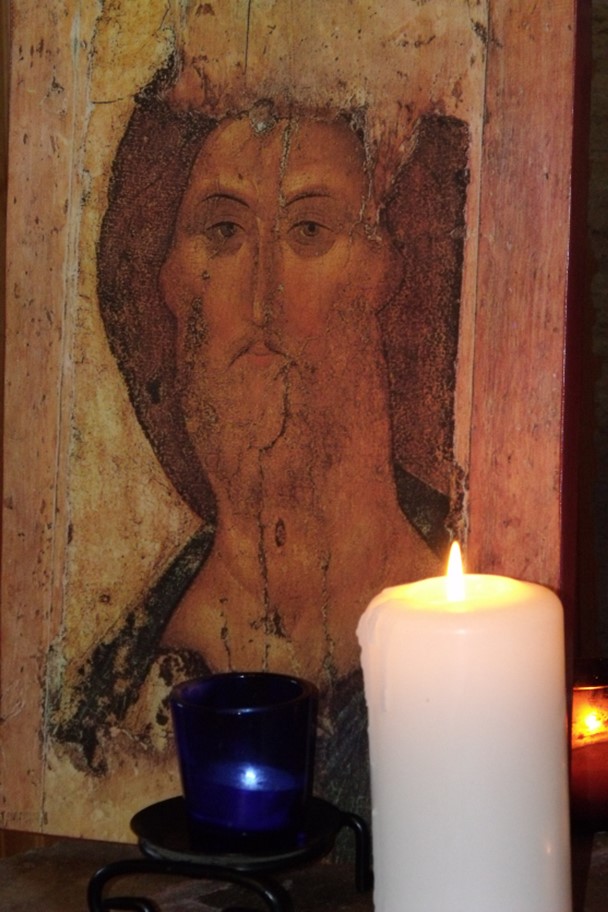
Something similar happens when we encounter Jesus in an honest authentic way. We do not simply get the Jesus we want, the One who consoles and comforts us, we get the Jesus we need, who wants us to learn from our mistakes, hurt, conflict. For example:
Charlie goes to see Fr. John because he is having marital problems. Fr. John greets him with great compassion, listens to his pain, and offers him a safe place to unload. The “afflicted” has been “comforted.“
Fr. John, being a wise spiritual director, also invites Charlie to examine his role in the conflict. Charlie admits that he’s been under a lot of pressure at work, has been drinking too much at home, and that his wife complains of being hurt and neglected. Now Fr. John gets to ask Charlie, who’s an active Catholic, “Are you the person you want to be in this marriage? Are you being the husband and father that you want to be in Christ?” The comforter has now become the afflicter (in a loving and kind way).
Charlie thinks about it. “No, I’m not being the person I want to be.”
“Well, who is that person you want to be in this marriage and family? And what are you doing that’s getting in the way of your being the husband and father you want to be and can be?
There’s silence. Fr. John lets it sit there for a while then says, “Tell me about your relationship with alcohol.” And for the first time in his life Charlie admits that he can’t manage his drinking. It’s out of control.
If Fr. John had offered only comfort, it would have allowed Charlie to hide behind Fr. John’s kindness and care. He would not have been challenged to mature, to grow up and take responsibility for his part in the conflict at home nor to make a realistic assessment of his drinking habits. This is not uncommon. Many active Catholics, Protestants, and Evangelicals use religious practices and friends to hide from the difficult and complex issues that keep them from maturing into healthy adults. They turn to Jesus for comfort but do not stick around for the “affliction/challenge” that they need to grow and mature in faith.
The beautiful thing is that when Jesus does “afflict” us, he walks with us every step of the way as we take a hard look at ourselves, address the issues within that are keeping us from growing in faith, and find the courage to mature.
Whatever your Lenten plan is, draw close to Jesus, receiving both his comfort and his “affliction.” In your prayer, at worship, with a spiritual companion or director, bring your struggles, your questions, your fears to Jesus. Allow Jesus to bless you with tender love and guide you along a path of life in the Trinity.
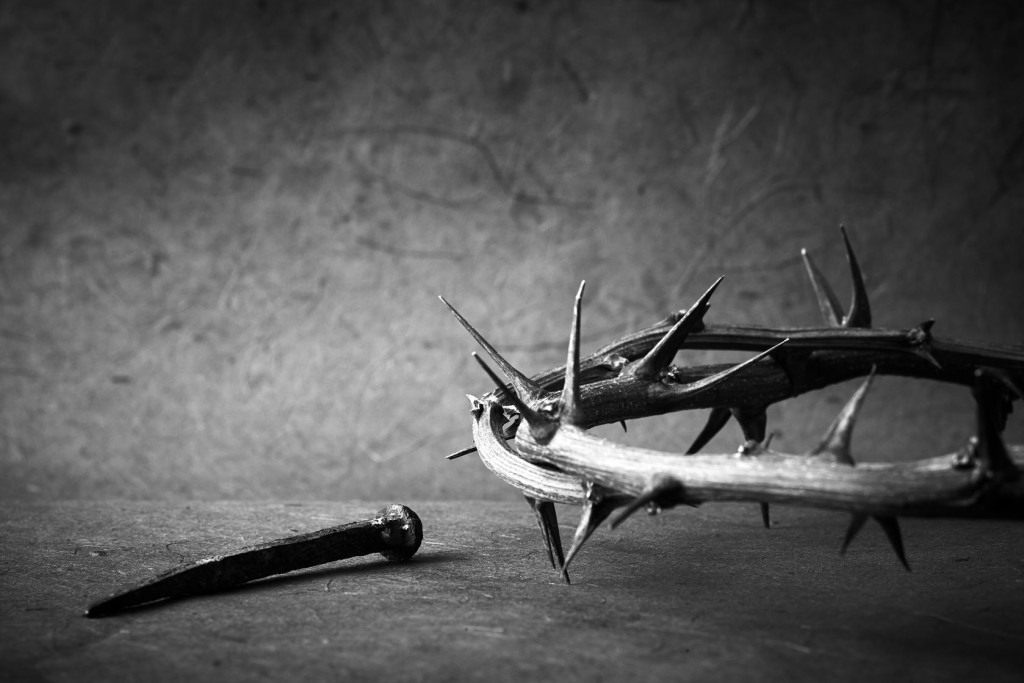
Fun, Spring Cleaning, and St. Brigid’s Day
By Robert Fontana
(reprint from 1/31/2016)

Faith can be fun for kids and adults alike. In fact, if it is not fun some of the time, even for us older folks, faith will lose its power to touch our imaginations and enrich our lives. One way to keep faith fun in the home is to select a few of your favorite saints – perhaps those saints with whom your children share a name or with whom your family has a cultural connection – and plan to celebrate their feast days in your home with good food, a children’s version of the saint’s story, and some sort of prayer ritual.
We Fontanas like to observe the Feasts of St. Joseph (March 19) who is the patron saint of Italy, St. Clare (August 11) and St. Francis (Oct 5), and of course, our Irish patrons (Lori’s side of the family) saints Patrick (March 17) and Brigid (Feb 1).
St. Brigid’s feast day is Thursday, February 1, which, in Ireland, also marks the first day of Spring. So on St. Brigid’s Day we are going to gather with family for some good Irish stew and some good Irish faith-fun, including the following prayer service:
Begin with this Prayer to St. Brigid
Saint Brigid, daughter of Ireland and lover of Jesus, draw us by your prayers into the living flame of God’s love. Help us to clean our hearts and homes of all that is selfish and sinful. Pray that we will be attentive to the poor and spiritually abandoned, that we will practice the Beatitudes in good times and bad, and that the warmth of God’s love will animate all that we say and do.
Each member of the home then takes a bandanna, handkerchief, or even a cloth napkin in hand and walks through the house, dusting the furniture, TV, books, and lamps, etc. singing “Alleluia, alleluia, alleluia.”
When the house has been thoroughly dusted, all go outside and tie the cloths on the branches of a shrub or tree (or porch railing). Then together, pray this prayer:
All: St. Brigid, come this day to our home and hearts; come by the power of God and be our guest. And help us, dear Brigid, to wipe away the dust of too much “me, and my, and mine” that we might love others with a selfless heart. We pray this in the name of Jesus. Amen.
Our Father…
Return to the house for dessert (Irish mint ice cream!)

NEW YEAR’S RESOLUTIONS THAT WILL CHANGE THE WORLD…ONE PERSON AT A TIME
By Robert Fontana

Every human being is a child of God, endowed with gifts to enable him or her to be a power for good in the world. At this time in history of great polarization, tribalism, and war, it is essential that we resolve to be the change in the world that will truly contribute to the common good. Here are a few suggestions:
1. Pray to the Holy Spirit every day for the grace to be alert to how you can be a power for good within the relationships, commitments ,and circumstances of your life, especially in the home and at work.
2. Cultivate silence in your day, 10-20 minutes of silence, to slowly learn to grow in self-awareness and to learn to listen with the ears of the heart.
3. Pray with and befriend a faith community different from your own. If you are an active Christian, consider meeting with a local Muslim, Hindu, or Jewish community. Be curious about what they believe and how this impacts how they live. As appropriate, share your own story of faith, and look for what you hold in common.

4. Make a commitment to be in nature 2-3 times (at least!) a month. Psychotherapists are increasingly urging clients to spend time in nature as a method for calming one’s anxieties and as an anecdote to depression. Nature has an enormous healing capacity for those open to it. This means time in nature (it could be your garden) to listen, feel the breezes and wind, and simply gaze at its beauty, rather than always doing the more active pursuits of hiking, skiing, and biking. Most people are “nature starved.” For Catholics, nature is a sacrament capable of revealing the hidden presence of God.
5. Strengthen the bonds with the primary people in your life. If you are married, work on your marriage. If you have children, have family meals throughout the week, and family time without electronics. Single or married, be intentional in spending time with those people who help you be your best self.

6. Lastly, during this election year, commit yourself to protecting democracy at home and abroad. This is not a partisan resolution. Whatever your politics, protecting democracy is essential for protecting religious freedom, freedom of the press, freedom to gather, and other freedoms outlined in the U. S. Constitution. To quote Winston Churchill: ‘Many forms of Government have been tried, and will be tried in this world of sin and woe. No one pretends that democracy is perfect or all-wise. Indeed it has been said that democracy is the worst form of Government except for all those other forms that have been tried from time to time.…’
The birth of Jesus for troubled times
By Kathleen Kichline

There are times in our lives and times in our world when Matthew’s telling is a more accurate rendering, when the circumstances Matthew describes resonate with our own experience. Matthew speaks of troubling dreams, Herod killing the children of Nazareth, and a family fleeing under the cover of darkness to seek refuge in a foreign land. This, too, is Christmas. It is “Christmas, The Rest of the Story.”
If we only focus on the familiar, beloved Lukan version, we can limit the manger to a gathering place for the wide-eyed child, for those singing “Joy to the World,” and for families reunited for the holidays. But Christmas is also for the one who just buried a loved one, for the parent who cannot afford food for their child—let alone a gift—for the sick, the confused, the addicted, and for those with nowhere to sleep that night. These may not recognize themselves in the perfection of the Lukan story, one we have painted over in the warm glow of Norman Rockwell scenes. The stark simplicity of the original telling has been spiced with gingerbread and peppermint, transferred to a snowy clime, plumped with festivities and food, and turned into a scene that resembles a Hallmark greeting card, a scene that painfully excludes those whose lives look nothing like that, whose lives are less than perfect, those, in fact, who are most in need.
What if the story were told instead of a father awakened by a nightmare to sit bolt upright in bed, cold with fear. Only it was no nightmare; it was warning, and it was real. He knew because the angel had warned him before and could be trusted. Evil, dangerous men were coming in search of his wife and his child, intent on murdering them in their beds. He only had time to awaken them, gather a few things, and flee into the night.
Guided by stars and perhaps more dreams, he leaned into the desert winds, looking over his shoulder, and shielding his family. They left all that they knew, uncertain of when or if they would return, and they descended into the foreign land of an ancient enemy, there to seek refuge and hide among those they did not know. And amid all that chaos, the story reaches its climax…that in the middle of all the chaos, God was with them.

Maybe if you have had cold sweats, have feared for your life or your child’s, have owned nothing more than what you could pack on your back, maybe if you have heard your neighbors’ screams in the night, have left behind family and friends, are alone, hungry and tired and aching, maybe you would hear this story and think, “Yes, that man is me. That story is like mine.” And when you heard the punchline, “God was with them,” you would be startled and look around to see if God could also be with you.
That might become your Christmas story, at least for this year. Once upon a time, you would say, when my life was in peril and at its worst, God was with me. That is what Emmanuel means, God-with-us. And that Christmas story would become your own.
_________________________________________________________________________________________
This article comes from Kathleen’s book, WHY THESE WOMEN? TAMAR, RAHAB, RUTH, AND BATHSHEBA (pp. 139-140); used with her permission. You can buy it on Amazon at https://www.amazon.com/Why-These-Women-Stories-Before/dp/B09R2WRK8W. Better yet, go to your local book store and ask them to order it for you!

Countdown to Epiphany, this prayer can help
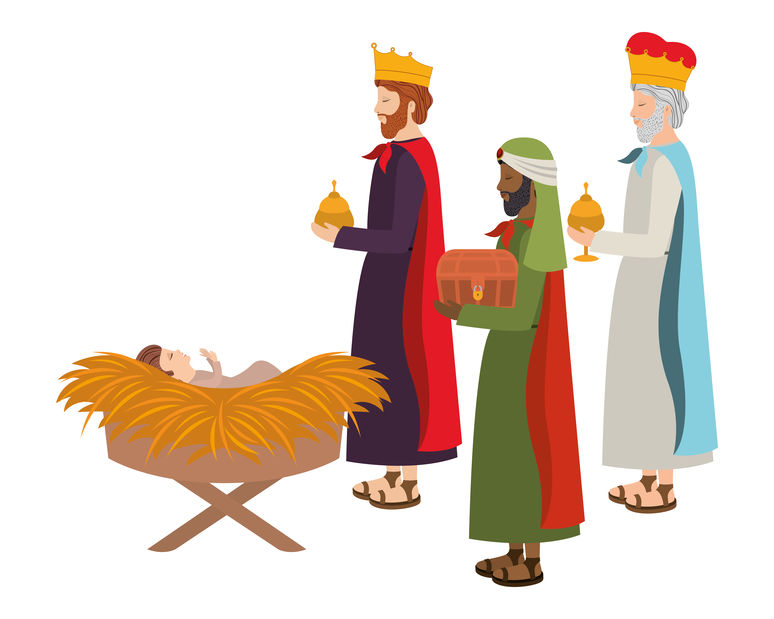
Many Catholics and other Christians do not celebrate the great feast of Epiphany which commemorates when the “Magi from the East” visited Bethlehem and the Christ child. They follow the secular trend of ending the Christmas celebration on Christmas Day or shortly thereafter. They might sing the popular Christmas carol, The Twelve Days of Christmas, but they do not understand its meaning. The title of the song refers to the 12 days between Christmas and Epiphany. Here’s what Wikipedia writes about this time period:
In many Western ecclesiastical traditions, Christmas Day is considered the “First Day of Christmas” and the Twelve Days are 25 December – 5 January, inclusive, making Twelfth Night on 5 January, which is Epiphany Eve. In some customs, the Twelve Days of Christmas are counted from sundown on the evening of 25 December until the morning of 6 January, meaning that the Twelfth Night falls on the evening 5 January and the Twelfth Day falls on 6 January.
We have a special family gathering on the Feast of Epiphany. It’s when we exchange gifts with one another, have a great meal together, make crowns of the Three Kings for all to wear, play games and sing carols. And to help us countdown from Christmas to Epiphany we have this prayer ritual at dinner for the Twelve Days of Christmas:
- Light three candles representing the gifts of gold, frankincense, and myrrh. Pray the following prayer together:
- To Bethlehem we travel with the Magi from the East, across the days of Christmas to the Epiphany Feast. Give us the courage of the Magi as we begin our search for you. Give us the eyes of the Magi that we might see the star that leads us too. And when we get to Bethlehem on that Holy Epiphany Day, give us the heart of the Magi that humbles us to pray.
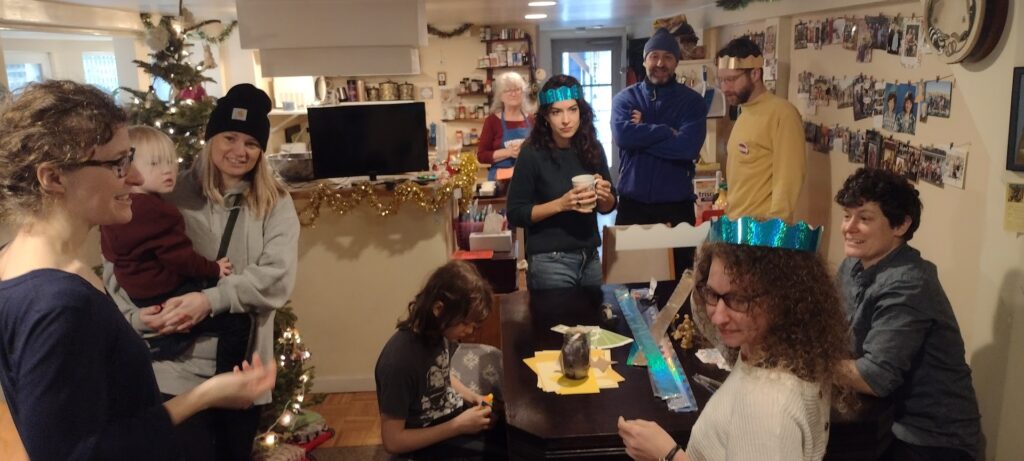
Plan a fun gathering for your family and friends for Epiphany on January 6, 2024. Happy Christmas – Epiphany season!
A love note to a Christmas tree
By Robert Fontana

I love you, O beautiful tree of Christmas. You enrich my life and the lives of all who gaze upon you in wonder and delight.
Your coming was awaited with childlike anticipation. And when you arrived, the busyness of the house stopped so all could welcome you. Treats were shared and wine was poured as you took your place in the corner of the family room, an honored guest.
You are lovely in your simplicity. Still, we dressed you with a string of lights that glow like fireflies in the night. Then your magic began, for it seems you are some sort of mystical portal to the past. I can see my father toasting his sons with a glass of Mogan and David and my mother, cigarette dangling from her mouth, laying tinsel strand by strand on the Christmas tree of my childhood.
Other memories emerge as we grace your branches with ornaments, some homemade, some gifted, some in honor of the holy event we commemorate, and some as playful as a toy plane, a doll, or an elf from Santa’s workshop. With each adornment, stories are shared. With each sharing, new images from the past flow around us: cousin Wade running in from the outside delirious with joy; my brothers in their red Boys Choir blazers preparing for midnight Mass; and friends gathered around the piano to sing “Sister Mary Had a-But One Child” to Mom’s accompaniment.
O Christmas Tree, I see in you all the Christmas trees of my past, from the great pine my brother John and I cut down and dragged into the family living room, to the silver one that shone brightly at Grandma’s house, to the very first tree of our marriage, a “tree” that Lori and I created from cast-off boughs collected at the Christmas tree lot because we could not afford even the $10 for the smallest tree.
We have gathered our children around you, and now our grandchildren, all in memory of the God of love who sent us Jesus to teach us how to love. You, O Christmas Tree, have been a sacrament of this season, a source of beauty and unity of past and present. And like the Christ-child who will give his life for all of creation, you give your life so that we may celebrate these days in the grace of your presence.
I do love you, O Christmas Tree, and I thank you!

I NEED CHRISTMAS (AND SO DO YOU!)
By Robert Fontana
I shared a bedroom with two brothers, Francis (older) and John (younger). On Christmas Eve, we three Santa Claus believers were on high alert listening for any signs of St. Nicholas. I clearly remember one night when we almost jumped out of our pajamas believing we had heard the jingle of bells outside, signaling the arrival of Santa and his sleigh. We rushed to the window and scanned the sky for signs of Santa. (Can you guess which one I am in the photo below?)
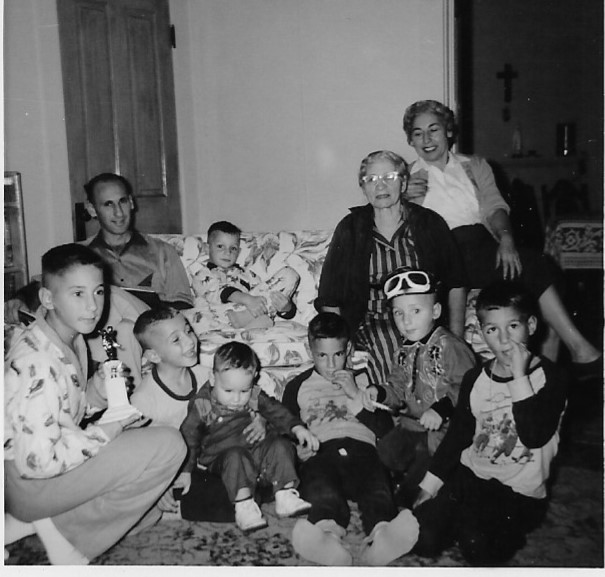
I’m not sure when we learned that Santa was just a fun story and the gifts that showed up after Midnight Mass came from Mom and Dad. But in that transition, I learned that the real reason for the “Christ – Mass” at midnight was the birth of God’s beloved Son, Jesus. That story carried me for a while with a child’s faith. I said my prayers at night – Our Father, Hail Mary and Glory Be – and during every football game my brothers played in.
My child’s faith, which was basically the faith of my parents, was transformed into my own personal faith when I was in 8th grade. Mom and Dad had been having marriage trouble. Rather than going to divorce court, they went to a prayer meeting; and each had a personal experience of Jesus that changed their lives. Their transformation transformed me. Dad shared his faith with me, and I had a burning in my heart to know God’s love and friendship as he did.
That made all the difference in my high school years. I struggled with all the same adolescent issues that others did, e.g. self-esteem, friendships, siblings, parental approval, sexual discipline, girls, college, academic challenges, athletic challenges, and developing the coping skills to handle all the emotional issues that come with teen life. Faith in Jesus offered me a healthy way to manage these difficult emotions and saved me from “going off the deep end.”
Not so for some of my friends who did not have the experience of faith that I had and coped with teenage life by dabbling in drugs, drinking, and sex. By the time college came around, these ways of coping were ingrained habits that nearly killed them. Thankfully, some found a path towards sobriety and loving relationships later in life. I believe I was protected from a similar path by God’s grace, and the Catholic Christian friends that I was meeting through the high school retreat program called Search.

I learned early on that “I wasn’t good because I loved God,” to quote Fr. Richard Rohr, “I was good because God loved me.” And I needed God’s love and the love of friends to continue working at being good and doing good. That was true in my youth, and it is true today. Pastor Rick Warren, the founder of Saddleback Church, once said, “Under the right circumstance I’m capable of any sin and, so are you.” When I heard that, I said to myself, “and so am I.”
I need Jesus and a community of faith in my life to help me live a healthy, holy, humane life this side of heaven. In fact, this is one of the reasons for Christmas. Jesus, God’s beloved Son, born of Mary, came to give men and women a better way to live, as summarized in the Great Commandment: love of God and love of neighbor. In following the Jesus way of living, we get a taste of heaven before heaven. Not perfectly, not without pain and suffering. Yet, the path of faith, hope, and love, embraced as a way of life, does yield the fruits of the Spirit described by Paul in Galatians, “love, joy, peace, patience, kindness, generosity, faithfulness, gentleness, and self-control.” Wouldn’t that be a taste of heaven if we had these qualities as a pattern for our lives?
That brings me to Christmas. Jesus is the reason for Christmas, and his legacy of unselfish love of neighbor animates this time of the year even in its secular form. We see the evidence beyond the lights and glitter of commercial Christmas: family and friends laying aside hurts and grudges and gathering in homes for song and merriment; Salvation Army and St. Vincent de Paul volunteers collecting money, toys, and clothing for those in need; neighbors reaching out to each other with a plate of cookies or gingerbread; and strangers offering one another a cheery “Merry Christmas” or “Happy Holidays.”
The power of Christmas to animate the culture was most eloquently expressed in Charles Dicken’s story A Christmas Carol.

Scrooge, arguing with his nephew Fred about Christmas, is emphatic that Christmas, because it has not made Fred a richer man, has done him no good. Here is Fred’s response:
“There are many things from which I might have derived good, by which I have not profited, I dare say, Christmas among the rest. But I am sure I have always thought of Christmas time, when it has come round, — apart from the veneration due to its sacred origin, if anything belonging to it can be apart from that, — as a good time; a kind, forgiving, charitable, pleasant time; the only time I know of, in the long calendar of the year, when men and women seem by one consent to open their shut-up hearts freely, and to think of people below them as if they really were fellow travelers to the grave, and not another race of creatures bound on other journeys. And therefore, Uncle, though it has never put a scrap of gold or silver in my pocket, I believe that it has done me good, and will do me good; and I say, God bless it!”
I need Christmas, and so do you. “God bless it!”
PS: I’m the one wearing the goggles. Francis is sitting next to my dad. John is the little guy with the white shoes.